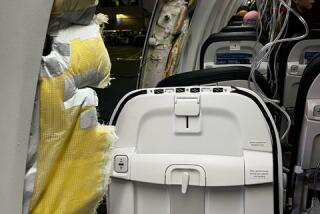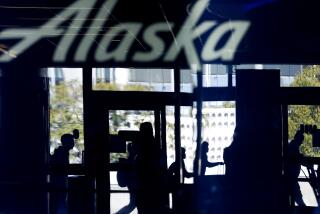2 Airline Leaders Have Different Flight Plans
- Share via
To hear Paul Barkley and Bruce Kennedy talk, it’s hard to believe that both manage regional airlines.
Especially when the two talk about what their industry will look like after a continuing wave of mergers and acquisitions subsides.
Their opinions are as different as the graphics painted on the sides of their jetliners.
Pacific Southwest Airlines Chairman Barkley is arguing that a “strategically sound mid-sized airline” need not be gobbled up by a major trunk carrier.
“With labor costs declining, interest rates coming down and fuel bills cut in half, we reported record profits for the third quarter,” Barkley said recently, contending that PSA was poised for a return to profitability.
Alaska Air Group Chairman Kennedy said he hopes his airline will remain independent, but last week he acknowledged that “logic tells you the big guys are going to have it all eventually.”
Kennedy’s logic seems to be supported by the record number of airline mergers and acquisitions that have been completed during the past year.
Last week, American Airlines said it would acquire Orange County-based AirCal for $225 million, and Alaska Air Group said it would spend $68 million to acquire Horizon Air. In recent months, Delta grabbed Western, Northwest acquired Republic, and Texas Air has been trying to merge Eastern into its system.
But despite repeated predictions by airline industry analysts that both regional carriers will be acquired, PSA and Alaska Airlines have remained stubbornly independent.
The two airlines have other similarities:
- Both began service with a single plane and gradually built fleets that include some of the nation’s most quiet and efficient jets.
- The two regional airlines’ planes fly far beyond what their names suggest. San Diego-based PSA has ventured out of the Pacific Southwest with service to the Pacific Northwest, and Seattle-based Alaska Air, thanks to a unique agreement with American Airlines, offers service to Chicago and Washington, D.C.
- PSA was wracked by a 52-day pilots’ strike in 1980 that forced the airline to halt scheduled service. Air Alaska lost millions of dollars last year when machinists struck for three months.
The big difference between the two regional airlines is that Pacific Southwest Airlines has not been profitable since 1979 and Alaska Air has been registering profits for the last 14 years.
“PSA always seems to be positioning itself for profitability,” Kennedy claimed last week during a San Diego visit to boost his airline’s decision to start service to San Diego next Monday. “They seem to operate in somewhat of a reactive mode” when a new competitor appears.
Alaska Air has “been profitable, and we think we have a fair shot at remaining profitable . . . (against) the big guys,” Kennedy boasted. “And we think we have a better set of tools (than PSA) to successfully compete as an independent.”
PSA, which has logged $216.2 million in pretax losses during the last six years, might indeed be positioned for its first profitable year since 1979, when it reported a $20.3-million pretax gain.
The airline, which is completing a $1-billion refurbishing of its jet fleet, finished the first three quarters of 1986 with an $18.3-million pretax ($11.7 million net) profit and, with no major fare wars on the horizon, could finish the year in the black.
“You can’t keep finishing the year with a pretax loss forever,” PSA President Russell Ray acknowledged last Tuesday. “That’s not the way to do business.”
PSA’s business has been providing frequent flights between destinations throughout the so-called California Corridor. Its 31 daily flights have captured 48.7% of air travel between Los Angeles and San Francisco. And more than half of the airline’s 550 daily flights originate and end at California airports.
“We specialize with high frequency,” Barkley said recently. “Very simply, we specialize in West Coast air travel--the businessperson’s answer to rapid transit.”
PSA carries 48.7% of the 8 million mainly business travelers whom PSA, AirCal, United and several smaller airlines court with 450 daily flights between California destinations.
AirCal controls 33% of the traffic and United is a distant third with 8.1%, according to a recent Department of Transportation report.
However, United last week said it would bolster its California routes by adding flights from its Los Angeles hub. Alaska Air, which has concentrated on the Pacific Northwest, will bolster its California schedule next Monday by initiating jet service from San Diego to Los Angeles, Seattle and Anchorage.
Looking past its California destinations, PSA has forged marketing agreements to attract passengers from Northwest Orient and Air Canada. PSA hopes to craft even more marketing arrangements in the future, Ray said.
The marketing agreements help PSA attract passengers from outside its traditional markets. Certain PSA flights register on travel agents’ screens as Northwest or Air Canada flights, giving those airlines the ability to book passengers through to airports where they are weak but PSA is strong.
Interestingly, Alaska Air downplays the importance of marketing agreements, preferring to go it alone, and Kennedy plans to drop Horizon’s marketing agreement with United Air Lines as soon as that acquisition becomes final.
However, Alaska has benefited from a strong relationship with American Airlines that involves sharing airplanes and crews. Consequently, Air Alaska passengers traveling from Anchorage to Washington, D.C., Dallas or Chicago might travel in an American airliner piloted by an Air Alaska crew.
Barkley views marketing agreements as especially important because well-heeled competitors such as American, United, Delta and Eastern control the computer reservations systems used by travel agents.
United’s Apollo reservation system will generate $325 million for the company by booking 33.6% of travel agent sales during 1986.
A group of smaller airlines, including Alaska Air, have brought suit in federal court asking that the computer systems be made “more equal,” according to Kennedy.
“I suppose we’ll get involved in that suit eventually,” Ray said.
More to Read
Inside the business of entertainment
The Wide Shot brings you news, analysis and insights on everything from streaming wars to production — and what it all means for the future.
You may occasionally receive promotional content from the Los Angeles Times.










